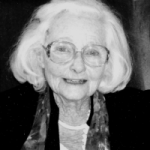
OUR BABIES, OURSELVES by Gloria Ohland
Magda Gerber’s approach to child care is like preventative medicine, and it’s therapeutic for both parent and child. Her philosophy – based on her psychoanalytic training and work as a child therapist – emphasizes self-acceptance, the need to set boundaries, the importance of ritual and of expressing your feelings, the fact that life is made up of choices which have consequences and that there are no victims. These are familiar principles to those who know 12-step-program theory, and their effect is at least as profound when applied to infant care. And while hers is a low-stress, simple and common –sense approach that acknowledges the realities of working moms, its vision is ambitious: “authentic” infants who become secure, autonomous, compassionate adults.
While too many theories of child-raising focus on making children do or be something more than they are, Magda argues the less we do the better, and suggests that many parents try too hard. She believes infants should be left to explore a child-safe environment with minimal adult intervention, because “spontaneous, self-initiated activities have an essential value. The pleasure evolving from exploration and mastery is self-reinforcing, and the infant becomes intrinsically motivated to learn.” But parents must also set aside quality time when they are simply available, watching and listening without judgment, thinking only of the child. Says Magda, “We are conditioned to always be doing something. But it is very comforting to know the parent is there, really there, without the little person being under pressure to do something to keep the parent’s attention.”
The key word in Magda’s vocabulary is respect – for parents and their needs as well as for their child’s. Even the smallest infant is looked at, handled and talked to as a thinking, feeling, participating human being, and never discussed in the third person if she can hear. “Many awful things have been done in the name of love,” says Magda. “But nothing awful can be done in the name of respect.”
Some of her very practical suggestions, with the caveat, “What you teach is yourselves”:
- Before you pick up a baby, tell him what you’re going to do. Do things with, not to or for, a baby.
- Allow the child to experience conflict and work it out for herself; let the child experience pain or sorrow, and let her choose when and if she wants to come to you for comfort.
- Be clear. Be honest. Ambivalence from a parent produces a nagging child.
- Children need expectations; they need to know the rules. Discipline is an integral part of a rooted, secure feeling. A child who is never told “no” is a neglected child.
- It’s a misconception that children must be happy all the time. That is not the way life is. If children discover that too late, they will find life difficult and frightening.
When Magda came here from Hungary in 1957, there was no such thing as an infant specialist. Even today, infant care in the USA is neither lucrative nor prestigious, despite our increasing recognition that basic patterns of coping, living and learning are set during the first three years of life. Magda’s Hungarian teacher and colleague, Dr. Emmi Pikler – who originated many of these ideas – was famous for her work with institutionalized children. At her residential nursery, she’d created an environment that encouraged them to reach their full potential. Many studies have since shown that these children don’t exhibit the impaired development – such as a lack of initiative and volition and an impersonality in relationships – associated with institutionalization, and have become healthy, well- adjusted adults.
Perhaps the best thing about Magda’s infant-care philosophy is that its wisdom works just as well in adult life. Mutual respect, and the trust and acceptance it engenders, open the door to well-being and happiness. As Magda says, “Lucky is the child who grows up with parents who basically accept and love themselves, and therefore can accept and love their child, who reminds them so often of their own selves.”
Gloria Ohland (gloriaohland@earthlink.net) is a longtime Southern California journalist and former staff writer at the LA Weekly.